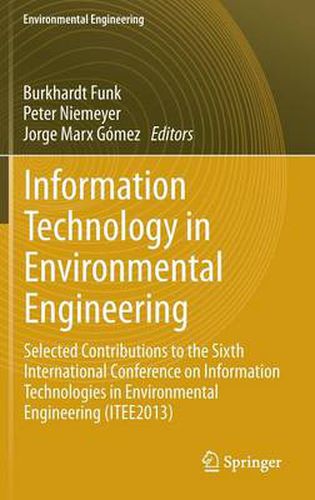Readings Newsletter
Become a Readings Member to make your shopping experience even easier.
Sign in or sign up for free!
You’re not far away from qualifying for FREE standard shipping within Australia
You’ve qualified for FREE standard shipping within Australia
The cart is loading…






This title is printed to order. This book may have been self-published. If so, we cannot guarantee the quality of the content. In the main most books will have gone through the editing process however some may not. We therefore suggest that you be aware of this before ordering this book. If in doubt check either the author or publisher’s details as we are unable to accept any returns unless they are faulty. Please contact us if you have any questions.
Information technologies have evolved to an enabling science for natural resource management and conservation, environmental engineering, scientific simulation and integrated assessment studies. Computing plays a significant role in the every day practices of environmental engineers, natural scientists, economists, and social scientists. The complexity of natural phenomena requires interdisciplinary approaches, where computing science offers the infrastructure for environmental data collection and management, scientific simulations, decision support, documentation and reporting. Ecology, environmental engineering and natural resource management comprise an excellent real-world testbed for IT system demonstration, while presenting new challenges for computer science. Complexity, uncertainty and scaling issues of natural systems constitute a demanding application domain for modelling, simulation and scientific workflows, data management and reporting, decision support and intelligent systems, distributed computing environments, geographical information systems, heterogeneous systems integration, software engineering, accounting systems, control systems, as well as sustainable manufacturing and reverse logistics. This books offers a collection of papers presented at the 6th International Conference on Environmental Engineering, held in July 2013, in Luneburg, Germany. Recent success stories in ecoinformatics, promising ideas and new challenges are discussed among computer scientists, environmental engineers, industrial engineers, economists and social scientists, demonstrating new paradigms for problem solving and decision making.
$9.00 standard shipping within Australia
FREE standard shipping within Australia for orders over $100.00
Express & International shipping calculated at checkout
This title is printed to order. This book may have been self-published. If so, we cannot guarantee the quality of the content. In the main most books will have gone through the editing process however some may not. We therefore suggest that you be aware of this before ordering this book. If in doubt check either the author or publisher’s details as we are unable to accept any returns unless they are faulty. Please contact us if you have any questions.
Information technologies have evolved to an enabling science for natural resource management and conservation, environmental engineering, scientific simulation and integrated assessment studies. Computing plays a significant role in the every day practices of environmental engineers, natural scientists, economists, and social scientists. The complexity of natural phenomena requires interdisciplinary approaches, where computing science offers the infrastructure for environmental data collection and management, scientific simulations, decision support, documentation and reporting. Ecology, environmental engineering and natural resource management comprise an excellent real-world testbed for IT system demonstration, while presenting new challenges for computer science. Complexity, uncertainty and scaling issues of natural systems constitute a demanding application domain for modelling, simulation and scientific workflows, data management and reporting, decision support and intelligent systems, distributed computing environments, geographical information systems, heterogeneous systems integration, software engineering, accounting systems, control systems, as well as sustainable manufacturing and reverse logistics. This books offers a collection of papers presented at the 6th International Conference on Environmental Engineering, held in July 2013, in Luneburg, Germany. Recent success stories in ecoinformatics, promising ideas and new challenges are discussed among computer scientists, environmental engineers, industrial engineers, economists and social scientists, demonstrating new paradigms for problem solving and decision making.